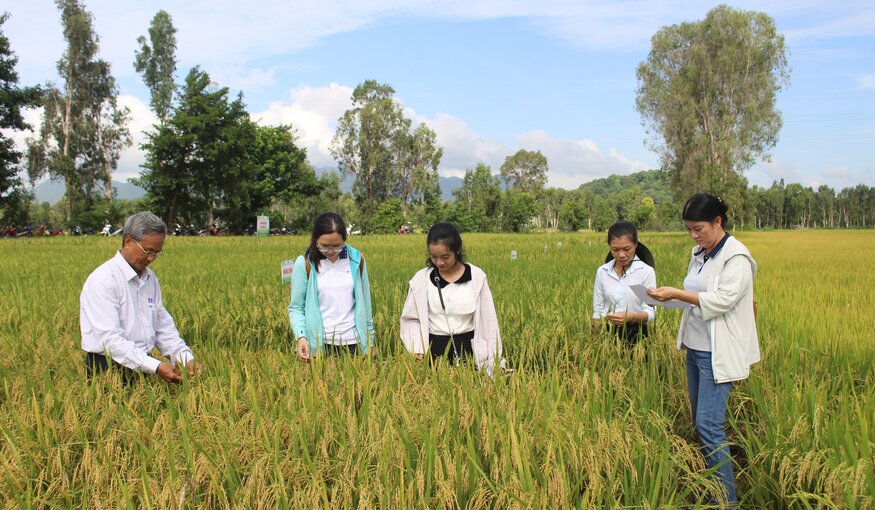Can Tho, Vietnam
26 October, 2023
 Photo: Mekong Delta Development Research Institute
Photo: Mekong Delta Development Research Institute
A new project is supporting rice farmers in Vietnam to unlock the genetic potential of the crop, by developing new resilient varieties, in a bid to safeguard rice harvests from the impacts of climate change.
The BOLD (‘Biodiversity for Opportunities, Livelihoods and Development’) project in Vietnam is being led by Mekong Delta Development Research Institute (MDI) at Can Tho University with support from the Crop Trust and funding from the Government of Norway.
The initiative focuses on collaboration with farmer groups, known as seed clubs, and has been praised by farmers for offering a brighter future for rice farming in Vietnam, by developing new climate resilient rice varieties for cultivation.
These new, improved rice varieties have been developed by crossing ‘wild relatives’ of rice with the domesticated crops, which are relied upon commercially.
Through a complex “pre-breeding” process, the desired traits of wild rice, such as improved resistance to drought or disease, are identified and then evaluated by genebanks, rice breeders and farmers, with the aim to ultimately produce new resilient varieties of the staple crop.
As Vietnam is the third largest global rice exporter, the crop holds immense significance for farmers, who depend on it not only for sustenance but as a vital source of income.
However, in the Mekong Delta in Southern Vietnam, where 90% of the nation’s rice exports are produced, the impacts of climate change including rising temperatures, erratic rainfalls and increased drought and pests, are making it increasingly difficult for farmers to bring in a good harvest.
Farmers from ten different seed clubs, including the Mekong Delta and the North and Central Highlands of Vietnam have played a crucial role in growing and selecting promising “lines” of rice.
Led by local farmers, these clubs are community-based and established to produce high-quality seeds. By working together, the members ensure seed security for their communities, conserve rice diversity, and promote this diversity through the breeding and cultivation of new rice varieties.
Mr. Tran Minh Hung, Nui Voi seed club leader said:
“The introduction of these promising seeds derived from wild rice gives us hope for a brighter future in rice farming. With these new varieties, we anticipate improved yields, increased resilience against climate change, and better livelihoods for farmers like me. This project will bring new life to our fields and communities.”
Shivali Sharma, a pre-breeding expert at the Crop Trust said:
“Under the BOLD Project in Vietnam, we work closely with national genebanks to access, characterize and use rice diversity for the development of new rice varieties. Our goal is to identify traits that farmers value, such as high yield, improved resistance to blast, and tolerance to drought and salinity.”
Huynh Quang Tin, agricultural research and project coordinator at MDI said:
“The BOLD in Vietnam project represents a significant milestone in our efforts to enhance rice production. We are leveraging innovative technologies and are working with numerous partners across the country to develop new, improved rice varieties that will benefit farmers and contribute to food security.”
About the Crop Trust
The Crop Trust is an international organization working to conserve crop diversity and thus protect global food and nutrition security. At the core of Crop Trust is an endowment fund dedicated to providing guaranteed long-term financial support to key genebanks worldwide. The Crop Trust supports the Svalbard Global Seed Vault and coordinates large-scale projects worldwide to secure crop diversity and make it available for use, globally forever and for the benefit of everyone. The Crop Trust is recognized as an essential element of the funding strategy of the International Treaty on Plant Genetic Resources for Food and Agriculture. Learn more at www.croptrust.org.
About Can Tho University (CTU)
The CTU is an important state higher education institution in the Mekong Delta. It is also the cultural, scientific and technical center of the Mekong Delta and Vietnam. CTU’s main missions are training, conducting scientific research, and transferring technology to serve the regional and national socio-economic development. In addition to its training responsibilities, CTU has actively taken part in scientific research projects, applying for the advances in scientific and technological knowledge to solving problems related to science, technology, economics, culture and society in the region. Thanks to its scientific research and international cooperation projects, the University has developed a variety of products and technological production processes that benefit people’s lives and promote export, thus helping the University gain prestige in national and international markets. Learn more at www.ctu.edu.vn
About the Biodiversity for Opportunities, Livelihoods and Development (BOLD) Project
BOLD (Biodiversity for Opportunities, Livelihoods, and Development) is a major 10-year project to strengthen food and nutrition security worldwide by supporting the conservation and use of crop diversity. The project works with national genebanks, pre-breeding and seed system partners globally. Funded by the government of Norway, BOLD is led by the Crop Trust in partnership with the Norwegian University of Life Sciences and the International Plant Treaty.